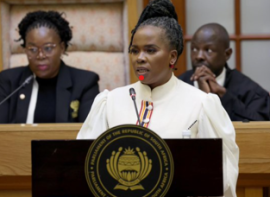
Employment and Labour Minister Nomakhosazana Meth has tabled a bold and forward-looking Budget Vote, pledging a “moral reckoning” with the crisis of unemployment, and a renewed focus on tangible labour market reforms that leave no worker behind.
Delivering the department’s Budget Vote in Parliament on Thursday afternoon, Meth acknowledged the daily struggles of millions of South Africans, especially the youth who wake up hopeful but jobless.
“We meet amid the daily struggles of millions of South Africans, who rise each morning with hope, but without work: young people who possess qualifications yet lack opportunity; families who stretch every rand to meet basic needs, and workers who labour without adequate protection, voice or dignity,” the Minister said.
The 2025/26 budget, totaling R4.153 billion, is structured as a policy tool for reform, aimed at delivering value amid fiscal constraints, while strengthening social protection and driving inclusive job creation.
The budget supports the priorities of the Government of National Unity (GNU) and the Medium-Term Development Plan (MTDP) 2024 – 2029, led by President Cyril Ramaphosa.
Highlighting the country’s vulnerability to global uncertainties, Meth noted the risk posed by potential exclusion from the African Growth and Opportunity Act (AGOA), which would have a direct impact on key labour-intensive industries such as steel, automotive manufacturing, textiles and agri-business.
“Thus, the importance of a stable, equitable, and fair domestic labour market becomes even more critical. Labour laws remain a central defence,” she said.
Worker protection
The department continues to strengthen its regulatory function. During the 2024/25 financial year, three new occupational health and safety regulations were promulgated, with draft construction regulations also published for public comment. The National Minimum Wage continues to improve incomes for vulnerable groups, including domestic and farm workers, women and youth.
Meth announced significant progress in regulating labour migration.
“I am pleased to confirm… that the National Labour Migration Policy has been approved by Cabinet.
"The Employment Services Amendment Bill was also approved by Cabinet for submission to Parliament,” she said, adding that these frameworks would curb the exploitation of undocumented workers and regulate labour broker practices.
However, transformation in the workplace remains slow. The 24th Commission for Employment Equity Report revealed that white South Africans still occupy 62% of top management positions, while women account for only 26.9%. Persons with disabilities make up just 1.2% of the workforce.
“These figures show continued exclusion of many qualified South Africans from full economic participation. Addressing this is essential to building equity,” Meth said.
The department is ramping up labour market research to shape evidence-based interventions, with a focus on gig work, pay equity, decent work in hospitality, the informal sector’s contribution to jobs, and the impact of foreign nationals in the higher education sector.
The National Employment Policy (NEP), now at an advanced stage, will serve as a framework to align macroeconomic, industrial, and skills development policies with employment growth.
The Minister also confirmed intensified coordination through the Gov-Bus platform and the National Pathway Management Network, which includes the SA Youth platform, now with five million registered youth and 1.57 million earning opportunities, 70% of which have benefited women.
“These are not mere statistics. They reflect concrete outcomes -- households supported, futures stabilised, and resilience built,” she noted.
To support employment targets, the D]department aims to facilitate the creation of two million jobs by 2030. Over R10.98 billion is allocated through Labour Activation Programmes to support 240 000 job placements in 2025/26.
A further R1.4 billion is earmarked for the Temporary Employer/Employee Relief Scheme (TERS), while R55 million will fund the Business Turnaround Programme to protect 3 750 jobs.
The Unemployment Insurance Fund (UIF), managing R38.4 billion, and the Compensation Fund, with a combined R8.45 billion in allocations, will continue to provide essential protection and benefits. Seventeen mobile buses will also bring UIF services to underserved communities.
The department is making significant strides in digital transformation, with over 79% of funded vacancies advertised and ongoing modernisation of ICT infrastructure.
“Let us be remembered not for the challenges we inherited, but for the solutions we executed. This budget reflects a State that is working visibly, efficiently and ethically for its people.
“Let us use it as a lever of delivery, inclusion, and renewal. Let us move forward with purpose, with unity, and with resolve to leave no worker behind," Meth said.
She called on all sectors of society to unite behind a common agenda to place employment at the heart of national development, driven by inclusion, innovation and impact. – SAnews.gov.za


